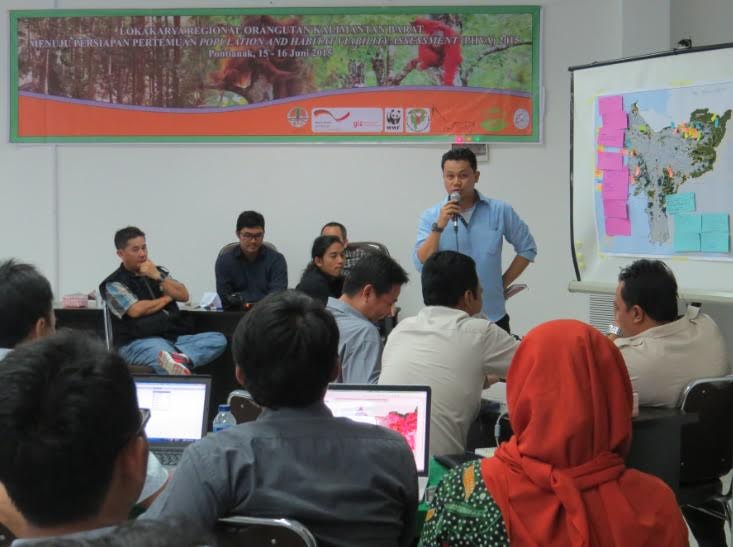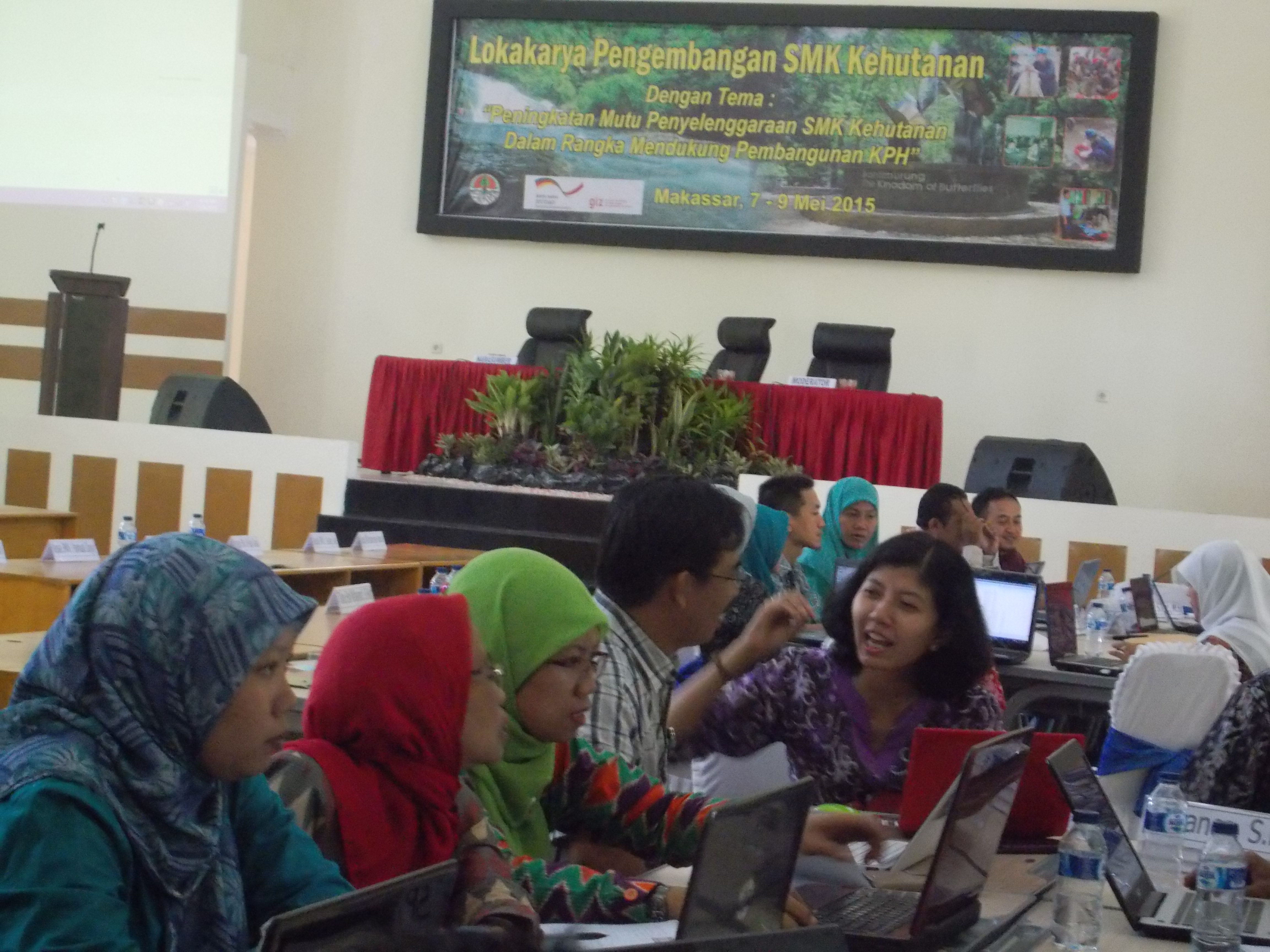FORCLIME
Forests and Climate Change ProgrammeTechnical Cooperation (TC Module)

Select your language

The Conservation and Natural Resources Agency (BKSDA) of West Kalimantan in collaboration with partner organizations such as FOKKAB (West Kalimantan Orangutan Conservation Forum), FORINA (Indonesian Orangutan Forum), WWF-Indonesia, GIZ FORCLIME, AKAR, and Titian Foundation, conducted a “Regional Workshop Kalimantan” on 15-16 June 2015. The objective of the meeting was to share information on orangutan distribution, population, and conservation efforts in West Kalimantan. It was conducted as a preparatory step to an upcoming “Population and Habitat Viability Assessment (PHVA)” that will be held in August 2015.
The Head of BKSDA West Kalimantan, Sustyo Iriyono, emphasised the importance of constant review and evaluation by experts and the government concerning orangutan matters in the province. "There is so much data available about orangutans which we have been collecting from 2004 until now. This data needs to be updated to ensure accuracy, " stated Sulistyo. The data and information to update the existing PHVA analysis on the distribution of orangutan populations and habitat viability derive from reports and scientific papers and are considered valuable inputs.
According to the Chairman of FOKKAB, Albertus Tjiu, "the results of this update will be submitted to the government as the responsible agency for protecting the endangered species of great apes". Eventually, this data will be used by the Government of Indonesia as a baseline to update the strategy and action plan for orangutan conservation in Indonesia that will be concluded in 2017.
For further information, please contact:
Ismet Khaeruddin, Strategic Area Manager for Biodiversity and Protected Area

With the aim of supporting the development of Forest Management Units (FMUs), the Centre of Forestry Education and Training (CFET) in collaboration with GIZ FORCLIME organized a workshop for principals and teachers of forestry vocational schools (SMK Kehutanan) on 7 – 9 May in Makassar, South Sulawesi. The purpose of the workshop was to improve the quality of training implementation at SMK Kehutanan towards FMU development. The workshop was attended by 90 participants representing 20 public and private SMK Kehutanan, under the supervision of the Ministry of Environment and Forestry (MoEF), and the Ministry of Education and Culture (MoEC), respectively.
During the opening ceremony, the Director General of the Board of Education and Human Resources Development of Forestry (BP2SDM), Dr. Tahrir Fathoni, emphasized that the curriculum of SMK Kehutanan should be in line with the needs of the market. The method of education through e-learning at the SMK Kehutanan as an innovative tool for capacity development will continue to be developed, and subject related to entrepreneurship will be delivered to students. Hence, Dr Tahrir welcomes the current and future cooperation with FORCLIME on this topic.
Edy Marbyanto, representative from GIZ FORCLIME mentioned in his speech that the SMK Kehutanan is a competency-based education. FORCLIME will support the forestry vocational schools, especially with regard to improving the capacity of teachers to train qualified graduates by applying innovative training approaches and new training curricula/modules on important topics for FMU development. Edy suggested the MoEF, MoEC, and SMK Kehutanan developing join roadmap for guiding the forestry vocational school development in the next five years. Mrs Djimlan, the Head of Production Forest Management Unit (KPHP) of Boalemo, Gorontalo province, was convinced with the performance of graduates of the forestry vocational schools in his FMU. Moreover he said that forestry vocational graduates are quick and skilled workers. Meanwhile Mr Jumadi, the Head of Protected Forest Management Units (KPHL) Pohuwato, Gorontalo Province, expects to have more forestry vocational graduates working in the FMUs.
Additional topics discussed during the workshop included the 2013 Curriculum Policy with speakers from the Directorate of Vocational Schools Management, and the Centre for Developing Curriculum of the Ministry of Education and Culture. Under supervising of resource persons, participantsare successfully preparing learning manual plan of four forestry expertise, which then will be distributed to all SMK Kehutanan. To enhance knowledge on conservation forest management, all workshop’s participants were invited to visit the Bantimurung National Park in South Sulawesi, which famous as the center for butterflies breeding
For further information, please contact:
Edy Marbyanto, Strategic Area Manager for Human Capacity Development

Increased awareness and consumer demand for products respecting social and environmental sustainability aspects has motivated commercial actors to change their business practices. Many standards and certification schemes are now being developed to ensure that agricultural commodities are produced and processed in a sustainable manner and take into account economic, social, and environmental issues.
GIZ FORCLIME together with Kalimajari Foundation initiated a series of activities to increase the capacities of small-scale cocoa farmers in implementing sustainable production systems. Overall, the activity aimed at building self-reliance of farmers and increasing the quality and quantity of cocoa beans.
The support provided in the two FORCLIME pilot districts Malinau (North Kalimantan) and Berau (East Kalimantan) involved representatives from local farmers and officials from the District Plantation Services. Knowledge transferred included cocoa farming practices and post harvest management, marketing strategies and joint marketing to strengthen the bargaining position of farmers. The series of activities included workshops and trainings on Good Agriculture Practices (GAP) and Good Manufacturing Practices (GMP).
The activities received positive feedback from farmers and government agencies in both regions. Farmers are committed to improve the quality of products through cocoa bean fermentation in accordance with the Indonesian National Standard (SNI) and implement joint marketing systems.
Indonesia is the third largest cocoa producer in the world after Côte d'Ivoire and Ghana, with the likeliness of even increasing annual cocoa export values in the future. As about 93 % of Indonesia’s cocoa plantations are managed by small-scale farmers, involving more than 1.4 million households, local cocoa farmers play an important role and need to be supported and participate actively in sustainable production mechanisms.
For further information, please contact: Heinz Terhorst, Strategic Area Manager, Green Economy.
 |
Supported By: |
  |